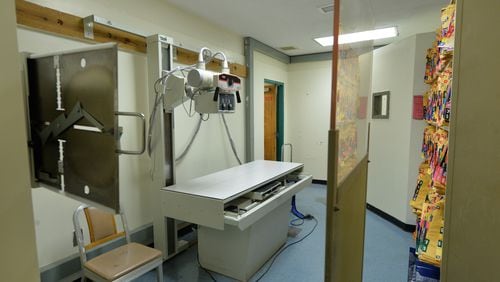Fulton County leaders decided earlier this year that they wanted to replace the company that provides health care at the jail. But with the current contract expiring at the end of the year and no new contract signed, they are quickly running out of time to make a change.
Though the county is required to provide health care at the jail, there are currently no plans for anyone to be screening inmates, taking care of sick calls, filling pharmaceutical needs or treating inmates for chemical dependency after Dec. 31.
The jail health care provider also tends to mental health needs, and between July and September, as many as 80 percent of inmates incarcerated during those months had some kind of mental health or behavioral issue.
“We can postpone this if we want to, but we’re playing with fire,” Commissioner Marvin Arrington said before commissioners delayed a decision for the second time Dec. 2.
A new contract is not on the agenda for commissioners’ last scheduled meeting of the year, on Wednesday, but could be added at the last-minute.
Commissioners are mandated to provide health care to inmates, so it is likely that some health care will be available after the first of the year. Fulton leaders, though, are trying to rethink their approach to criminal justice, and are wary of signing a long-term contract that is in opposition to whatever model they come up with going forward.
Leaders want to reduce the number of homeless, addicted and mentally ill people who crowd the public safety system. The creation of a team that will design a pre-arrest diversion program to help with that challenge will be voted on Wednesday.
But the jail health care contract has to be in place before any changes are made, and the likelihood that any new contract won’t reflect future changes has been frustrating to commissioners.
In twice failing to decide who will provide health care at the jail, county commissioners are balking at the ever-increasing costs. Even as they take steps to reduce the population in the jail, 2016 health care costs are more than $1.5 million higher than they were this year.
Chairman John Eaves, who has visited jails in other metro areas, suggested last month that the county rebid the $17.8 million contract with a company called NaphCare in hopes of finding a system that was both less expensive and “smarter.” He said some cities are saving money on jail health care by immediately directing people to mental health providers instead of booking them into the jail. That strategy, and others, could help reduce the medical care costs and needs at the jail, he said.
Since the contract first went out in the spring, the county’s “motive has changed” for how it intends to deal with jail health care, Commission Vice Chairman Liz Hausmann said. Hausmann said she was wary of making a big change in the contract now by choosing a new provider — the current one is Corizon — when another change might be needed after the jail plan is updated.
Commissioner Lee Morris also said there was a “disconnect” between the direction Fulton wants to go in and what choices are currently available.
“I’m feeling like our backs are to the wall,” he said. “The last thing we want is for it to be Jan. 1 and nobody’s there.”
Corizon’s bid was the least expensive, at $17.03 million, but other issues with the company meant it didn’t make the short list. Corizon’s flaws include failure to provide a functioning electronic medical record system for use at the jail, as was promised in their previous contract, said George Herron, director of health services at the county’s sheriff’s department.
Martha Harbin, a spokeswoman for Corizon, said because the bid is still open, she didn’t feel comfortable responding to questions “in case they are interpreted by anyone involved as seeking to influence the procurement.”
This year, the county's Rice Street jail finally got out from under a 2006 consent decree that stemmed from a lawsuit filed by the Southern Center for Human Rights over jail conditions. The county spent millions to replace cell locks, improve staffing and upgrade plumbing.
Commissioners’ decision to delay may mean that NaphCare, their top-ranked choice, does not have the time to adequately staff the facility, even if commissioners decide to vote on their proposal at their next meeting, on Wednesday. NaphCare said it would need four weeks to staff up for the jail if it won the bid.
Commissioners may need to ask Corizon for a short-term extension, if they decide to go elsewhere, so NaphCare or any other provider has time to hire employees. Still, a longer-term contract could give Fulton leaders more time to create the pre-arrest diversion program they have in mind, or make other changes to the system. Commissioners initially rejected NaphCare’s proposal in November; calls earlier this month to approve NaphCare and to extend the Corizon contract both failed, for lack of votes.
“We’re mandated to provide the service,” Commissioner Bob Ellis said. “It’s a little late in the game in terms of trying to potentially revisit the contract.”








